12:55
Ilham Aliyev was interviewed by China's CGTN television channel in Beijing
26 April 2025, 12:55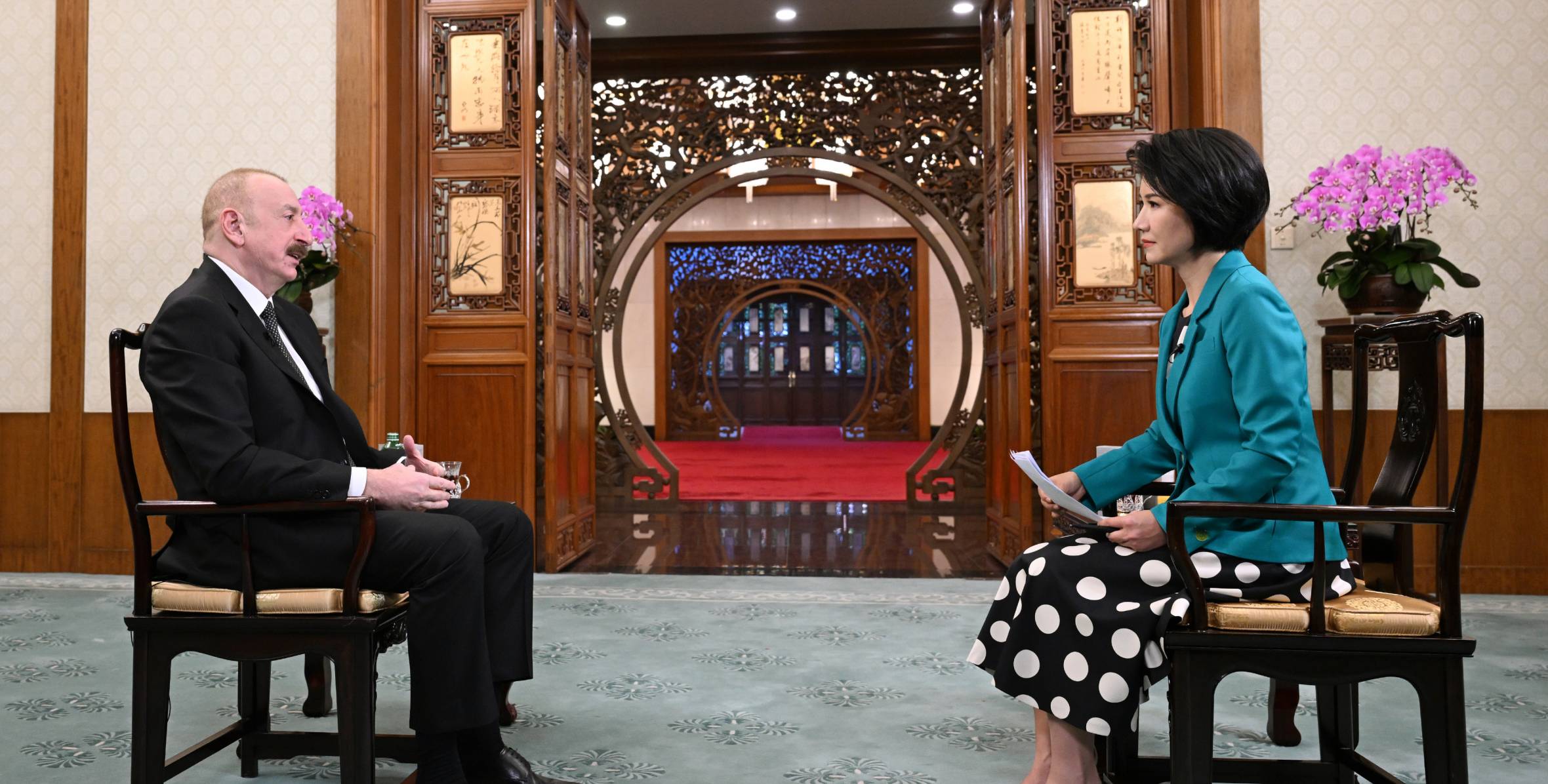
President of the Republic of Azerbaijan Ilham Aliyev was interviewed by China Global Television Network (CGTN) in Beijing.
The interview was aired on this TV channel on April 25.
Correspondent Liu Xin: Your Excellency President Aliyev, welcome to “Leaders Talk”.
President Ilham Aliyev: Thank you.
- It's a great honor to have you on the show again. This is the first time, this is the first state visit to China in six years. Last time, you described your trip or you described bilateral relationship as very good. So, if I asked you to use an adjective to describe your trip and bilateral ties, what would you say?
- Now, I would say they are excellent. Yes, you're right. It's my visit in six years. But in the meantime, I had the chance to meet President Xi Jinping on several occasions. The last time we met was last July on the sidelines of an international event, where we adopted a Declaration on Strategic Partnership. So, it was a very important milestone in our cooperation because it elevated our relations to a higher level. Today, despite the fact that less than one year has passed since our last meeting, we signed with President Xi Jinping a Declaration on Comprehensive Strategic Partnership. So, we have elevated our relationship even higher. Along with that, 20 more documents have been signed, which cover a broad range of areas. So, I would say that the relations as well as the visit are excellent. I'm very satisfied with the results. First, I'm very honored that President Xi Jinping invited me to pay a state visit to China. The atmosphere, hospitality, friendship, and also substance of our discussions were really very encouraging. We elevated our relations to a high level.
- Great. Congratulations on that by the way.
- Thank you.
- But did you notice anything different this time? Whether something left an impression on you on a personal level.
- Today, during my meetings with the Chinese leadership, I underlined that every time I come to China, I see development. I see a lot of new infrastructure projects, new buildings, beautiful city. I congratulated my friends on extraordinary achievements in social and economic development, as well as China’s activity on international arena. Coming here is always a great pleasure. I've been here many times. My first visit to China was in 2005. Over these 20 years, I witnessed the rapid development and extraordinary transformation of the country. What can be seen, what I read about the economic performance and what I get as information really demonstrates that your country is on the right track. Congratulations on that.
- Thank you. Recently, while participating in an international forum, you actually said that “It is a very important milestone in bilateral relationship between China and Azerbaijan because having a strategic partnership format of cooperation with such a great country as China is of extreme importance for us.” So I want to ask you a little bit more, now that you have raised this relationship to a comprehensive strategic partnership. What specifically will that mean for bilateral ties and what specifically will that mean for the people of Azerbaijan?
- First of all, if you look at the text of the Joint Declaration on Comprehensive Strategic Partnership, you will see the broad agenda of bilateral relations. Our countries demonstrate solidarity and friendship on the issues of national interest. We strongly support each other's sovereignty and territorial integrity. We strongly support “One China” policy. We were among the first countries, which publicly and openly denounced illegal elections in Taiwan.
Another part of the Declaration covers a broad range of issues, starting from trade, transportation, people-to-people contacts, humanitarian partnership, and, of course, our joint initiative. So the substance of this document is very important.
So, signing a declaration with such a country is really an important achievement for Azerbaijan. I can tell you that Azerbaijan signed the Declaration on Strategic Partnership with many countries in our region and also with some European countries, but China is the strongest among them. That's why, I think the extreme importance of this document, once again, is obvious.
- You and President Xi enjoy a very deep rapport. You have met each other on many different occasions. How do you usually interact with each other, and how do you find him as a state leader?
- We have very friendly relations. At one meeting, he called me a good friend of China. That was a kind of an award to me. I always enjoy meeting with him and talking to him in a very sincere and open manner. We spent a lot of time during our negotiations, and then we talked throughout the official lunch.
We covered many areas of regional stability, security, international relations. For me, it's always important to know his position, when we share some views between us on different issues, because he's a very experienced statesman, a person I deeply respect, a person who has a very deep knowledge and a very firm position with respect to the national interests of China and, the way he treats the global affairs in general.
As you probably know, Azerbaijan has joined several of President Xi Jinping’s initiatives on development, security, and civilization. We share his view. We were among the first countries to openly support and then join the “One Belt, One Road” initiative, and we have implemented a lot of infrastructure projects on our soil.
So really, it's always a pleasure to meet with him. He is a leader of one of the most powerful countries in the world, but he's a very modest and friendly person. He creates an atmosphere where you feel like you’re speaking with an old friend.
- That's great to hear. I watched the news today and I heard his original soundbite in meeting with you in the Great Hall of the People, and I was very much impressed by what he mentioned as the original aspirations about the founding of diplomatic ties between the two countries. And with that, we have to talk about your late father, who played a very important role in establishing a friendly and visionary, I would say, relationship with China. Back then China was yet to take off, let's say, in terms of economic relationship. What would you have told your father, your late father, seeing the changes that you've seen and seeing the level of relationship that these bilateral ties have elevated?
- You're absolutely right. He played an important role in building relationship between the two countries based on a solid foundation. When he became president, one of his first visits—I believe, about a year later—was to China.
- In the early 1990s.
- Yes, it was, I think, in 1994. And that was the day when we built those relationships. His legacy is dear for all of us. We follow his path, including in our foreign policy priorities. Among these priorities, China has a special place. Definitely, during the last 20 years, the world has changed. Azerbaijan has changed. But priorities have not changed. I think if he could see from heaven where we are now, I think, he would proud of Azerbaijan and of Chinese-Azerbaijan relationship.
- You talk about reform that your father initiated. You have also started to implement broad-based reforms. Could you report you have done something, that the country has actually moved on from just exporting resources to building industries that are modern, that are green. What could you tell us on that front? And what role has China played in that regard?
- Well, the example of China and its modernization and reforms are inspiring for many countries. It's a matter of how the countries use this experience, how the leaders of different countries can learn from positive experiences of other countries. I can tell you that the path of progress of China was inspiring for us. As far as I'm concerned, my primary objective when I assumed the office was to preserve political and social stability in the country. At that time, the country was very poor. Of course, we were a subject of penetration, attempts to influence our policy, and interference in our domestic affairs from different Western circles. Under these circumstances, preserving political stability, security, and safety was task number one because I clearly realized that without that, we could not develop. And that was done.
Then, we started to build a strong economy. So today, foreign debt of Azerbaijan is less than 7% of GDP. Our hard currency reserves are 14 times more than our foreign debt. So we reduced unemployment, poverty to the level of 5%. We diversified our economy. As you mentioned, the green agenda is one of the main priorities. China is playing a very important role in that because the solar panels installed in Azerbaijan are made in China.
- I heard that. You were talking about that. And I'm really happy that green energy is the new field of potential. I want to hear a little bit more, for instance, how do you believe the two countries can unlock greater potential in terms of green energy cooperation. What tangible improvements is this going to bring to the people of Azerbaijan?
- So for the time being, Chinese companies are working as contractors with the companies investing in green energy of Azerbaijan. So far, the contracts we have signed, and which are now in the phase of implementation, will give us 6,500 megawatts of renewable energy by 2030. Just for comparison, the total installed capacity of Azerbaijan is 8,000 megawatts. So, in five years, we will almost double today's electric energy capacity. Of that, 6,000 megawatts will come from solar and wind, and 500 megawatts from hydro. That will be crucial for us, because we will largely stop using natural gas to produce electricity. We will have electricity from renewables, and we will export natural gas to international markets, and, of course, make a lot of profit. At the same time, we will save energy for domestic needs. We have already purchased 160 electric buses, which are already operating on the streets. Everybody is happy about that. We contracted 200 more. And most importantly, this year, hopefully, we will start joint manufacturing of BYD electric buses in Azerbaijan with a capacity of 500 buses a year. So our plan is to convert Baku public transportation completely to green, and after that, all the other cities of Azerbaijan. So, we have a really unique opportunity to work on a bilateral track with respect to renewables because it is in line with our strategy and your agenda.
- And today's signing of the Comprehensive Strategic Partnership will give more political impetus for that kind of initiative.
- Exactly.
- You know what, President, we have been talking, and I'm kind of thirsty. And we have the tea right next to it.
- I understand what you mean.
- I've been eyeing it for some time. So cheers.
- Cheers.
- Oh, okay, cheers. It's a real pleasure. It's the first time I taste Azerbaijani tea.
- Oh, really?
- Yeah, and it's so beautiful, the cup. I want to know what it is.
- Yeah, it's a national kind of glass. You know, the form is like, I think, like a pear. The form actually is to keep the hot, because we usually drink tea very hot.
- Very hot, I see.
- So it does not get cold. This form keeps the bottom hot.
- I see. It adds to the taste, definitely.
- But I noticed in China, the tea is served not very hot. Is that true?
- Also very hot. Maybe because you are guests, they don't want to injure you. So they are being very polite and careful. But we share a lot in common in terms of tea, for instance. We all love drinking tea, but with a variation. And that brings us, if I may, to many things. You know, the ancient Silk Road, for instance, I can talk about. Or we can talk about the people-to-people exchanges, tourism. I understand your country unilaterally exempt visa for Chinese tourists since about a year. And now, during this visit, would you like to share with us the latest news?
- Yes, it's great news that today we signed a totally visa-free regime for every passports, including ordinary passports. We are very grateful to our Chinese friends that they made the reciprocal step. As you correctly mentioned, last year we unilaterally lifted visa requirements for Chinese citizens. That was the first time.
- The first time for Azerbaijan to do this to a foreign country?
- First time unilaterally.
- China has had a really special treatment.
- Yes, this is true. Yes, exactly. Usually we did it on bilateral grounds. But in this case, we did it unilaterally to demonstrate our friendship and openness. We also talked today with my colleagues about increasing the number of flights. Today we have, I think, six or seven flights per week. And having in mind that we almost received twice as many visitors from China last year after the visa regime was abolished, we hope that the number will grow. Today, I learned that 150 million Chinese people travel abroad. In one of my meetings I said, if only 1% comes to Azerbaijan, that will be enough for us. Of course, we want to develop our tourism sector. We have geographical advantages – the Caspian Sea, ski resorts, forests and rivers, and even a semi-desert areas. Everyone can find a place to enjoy, plus very good cuisine and hospitable people. We just need to present ourselves, to make a country presentation, and to eliminate visa regimes with friendly countries. It's a historical day today, and very good news for Azerbaijani citizens, so they can just buy a ticket and come to China.
- But how about the other way around? How important it is for Azerbaijani or other people travelling via Azerbaijan to come to China, see things for themselves, to come and study, to come and work? I actually know a young man who came to China through the Belt and Road to summer camp. And he stayed. He's now pursuing a PhD. And he has found a new future for himself. So what about the other way around?
- Yes, definitely. We want more Azerbaijanis to visit China — to travel, to study, and to work. Today, we also discussed our cooperation in the field of education. We have more than 100 students from both countries studying in our countries.
- That's too few.
- But it is too few, yes. I'm sure their number should grow, especially taking into account the potential in technological development, especially in artificial intelligence. We want to be in line with the global trend. I think there is a great opportunity to have a higher number of students from Azerbaijan coming here. I think it will be a good idea to think about a Chinese-Azerbaijani University in Azerbaijan. So we are now in the phase of evaluation of this opportunity. Definitely, the more people travel, the more they know the culture, the people, the closer the ties become between the countries. Because, yes, we make political decisions. We are strategic partners. We are friends as leaders and as governments. We need people to be closer and to be also friends.
- Absolutely. And not just for people to travel, but for goods as well. And Azerbaijan will… Let me take another sip. It's really good. And with a little lime, lemon, I guess, and some sugar, I guess it must be better. So, we probably will have more. By the way, these are from Azerbaijan.
- Yes, I know.
- Azerbaijani tea, different flavor.
- And mineral water also from Azerbaijan is very good by the way.
- Is this one?
- Yes, it's very good for health.
- Istisu?
- Istisu. That means warm water. It comes from spring, which is almost hot.
- All right. I'm sure the Chinese will be looking into their Taobao or JD accounts and see, can I find it? But, yeah, really, I mean, in terms of travel of goods, right, Azerbaijan has stepped up greatly with China. China is one of the top five trading partners of Azerbaijan.
- Top four already.
- Okay, it's climbing. It's climbing. And China is the biggest exporter or the number one source of import.
- Exactly.
- So how do you look at the kind of e-commerce under the umbrella of Belt and Road, you know, the infrastructure connectivity, the goods connectivity? What is that going to bring to people and businesses on both sides?
- Yeah, that's absolutely important what you say, because China is really number one partner in imports and number four partner in trade turnover. We’ve opened six Azerbaijani trade houses in China. We have already started exporting wine to China. We want to have more share in your market. With respect to the Belt and Road, for us, this initiative is not only a kind of a transit route. We want to build businesses along the route, because our geographical location is advantageous. We are situated along the East-West and North-South transportation corridors. With respect to connectivity, we have already built all infrastructure: railroads, seaports, highways, eight international airports. We have one of the biggest air cargo companies on global scale. Our target is to build businesses along the route. Of course, we count on Chinese companies. Just less than a week ago, at a business forum, different companies from both countries signed investment agreements with Azerbaijan worth more than $300 million. I said today to my colleagues that for us it's a good number. But I think it can be bigger.
- Do you have a number in your mind? That in two years, five years?
- I want to talk about billions, and I think this is absolutely realistic. Now our target is renewables, transportation and manufacturing. We have a skilled labor force, a growing population, growing market. Doing business in Azerbaijan from the perspective of taxes and different legal requirements is very easy - a lot of incentives. I think that we just need to bring the sides together and to convey more information about business opportunities of Azerbaijan to Chinese entrepreneurs.
- Well, Azerbaijan, you mentioned, is one of the first countries to publicly support Belt and Road Initiative, and this initiative has entered the second decade, and much more remains to be done. What is your vision going forward?
- We have already established a joint venture with our neighbors to make the passage of cargos much easier and quicker. Today, for instance, with respect to transportation infrastructure and also administration reforms in our customs, including digitalization, the time for cargos from China to Black Sea through Azerbaijan is only from 10 to 12 days. Last year we had an 86% growth in transit transportation between China and Azerbaijan. As I said today, this is only the beginning. Transportation routes through Azerbaijan will be, I think, one of the safest, shortest and the most attractive among other routes, which are available today.
- I wish you good luck on that. And I believe Chinese business will discern the advantages that Azerbaijan has to offer. Azerbaijan is at a very strategic location hub connecting Europe and Asia and a very important connecting point for Central Asia and Western China as well. How do you see the advantages and the role that Azerbaijan wants to play in that region, and what do you want to do to promote regional peace and prosperity from your country's perspective?
- You're absolutely right. We are just located between Asia and Europe and between North and South, so both transportation corridors cross Azerbaijan. But to become really an important transit country, you have to have good relations with your neighbors and with the neighbors of your neighbors. That's what we're trying to do. And I think we achieved that.
- You talk about neighbors and neighbors of neighbors, which is very important because the Shanghai Cooperation Organization, which is a very important regional platform, and more and more country is joining in, Azerbaijan is a dialog partner, and this year, China is officially assuming the rotating presidency. How do you look at the role of organization of this kind for the region and possibly for the wider region, and how do you look at the relevance of the Shanghai spirit? And I'm going to articulate here, which means mutual trust, mutual benefit, equality, consultation, respect for the diversity of civilizations and pursuit of common development.
- All what you've mentioned is part of our policy and our agenda. Azerbaijan is a strong supporter of multilateralism. Of course, we want to be closer to the Shanghai Cooperation Organization. President Xi Jinping invited me to participate in the summit. So, I will be back to China in several months again.
- Oh, thank you for letting us know.
- Yes, and I think that it will be beneficial for organization and for Azerbaijan if we are closer, because we are on the western side of the Caspian. We are, at the same time, the South Caucasus country with strong political ties with transportation infrastructure projects. As strategic partners with China, of course, I think there are a lot of opportunities to work under umbrella of the Shanghai Cooperation Organization.
- You also a member of the Global South, which is a very important force in today's world. How do you look at the potential for China and countries such as Azerbaijan to join hands and work together in multilateral arenas? Because we have faced with a lot of unilateralism, unilateralist tendencies, let's say, what kind of potential, what kind of roles can we play together?
- I think we must be proactive. I think we must continue to be proactive. Azerbaijan is an active member of the Global South. We demonstrated it, not only through our Non-Alignment Movement chairmanship, but also as the Presidency of COP29. As a Presidency of COP29, we held a COP29 conference, where I personally defended strongly the interests of the Global South and raised the concern of countries of the Global South with respect to the existential threat to some countries with respect to climate change.
And we, in Azerbaijan, consider China as a leader of the Global South. So this is a special role, which we think China is playing, uniting countries among particularly those principles of the Non-Aligned Movement, the so-called Bandung principles, actually reflect everything you said, plus sovereignty, territorial integrity, non-interference in internal affairs, equality, multilateralism, and no domination by any country or group of countries. This is a principle that is very close to us, and we defend it by protecting our national interests and being a very active member of the international community.
- Thank you so much, President Aliyev.
- Thank you.
- It's been a great pleasure. Thank you.
- Thank you.
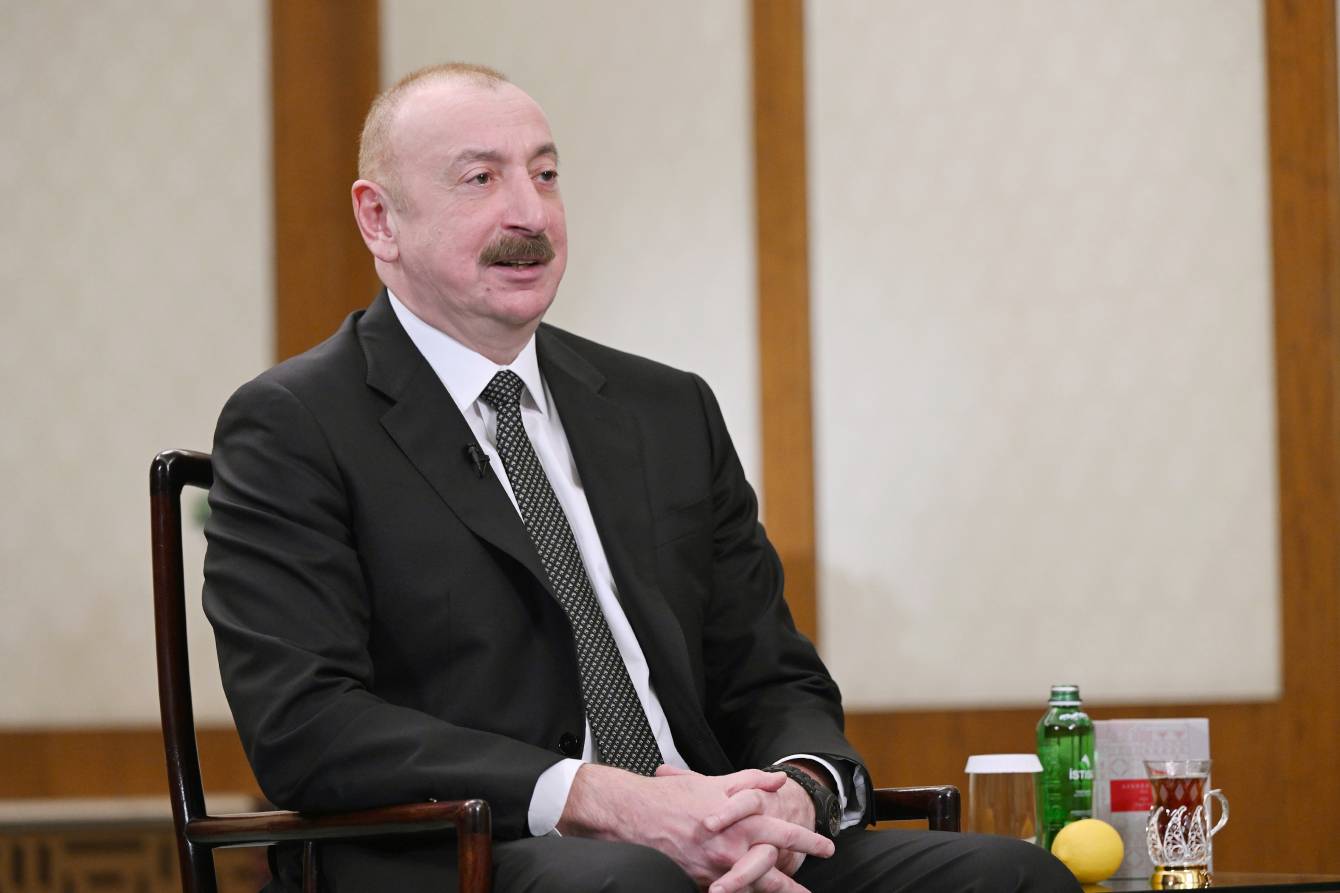
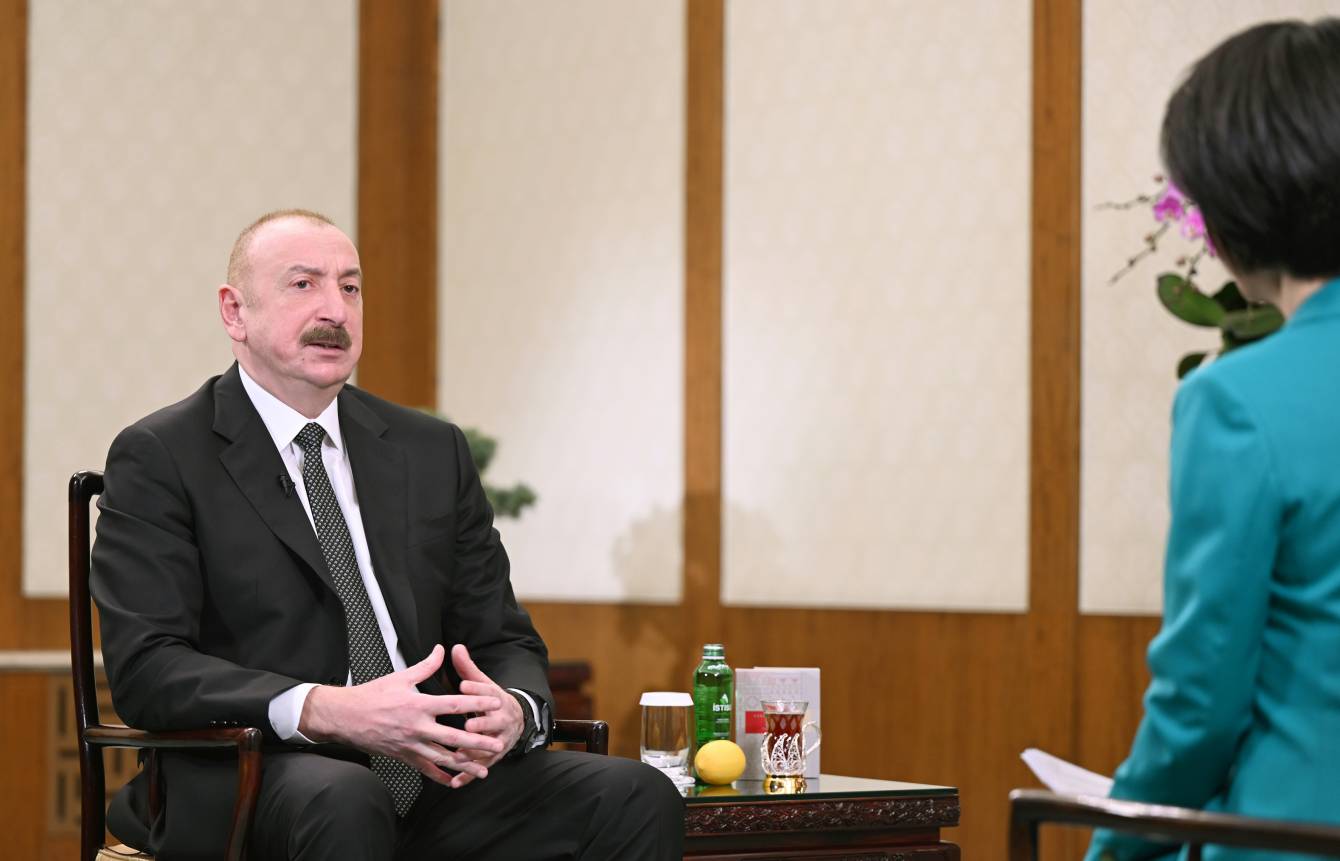
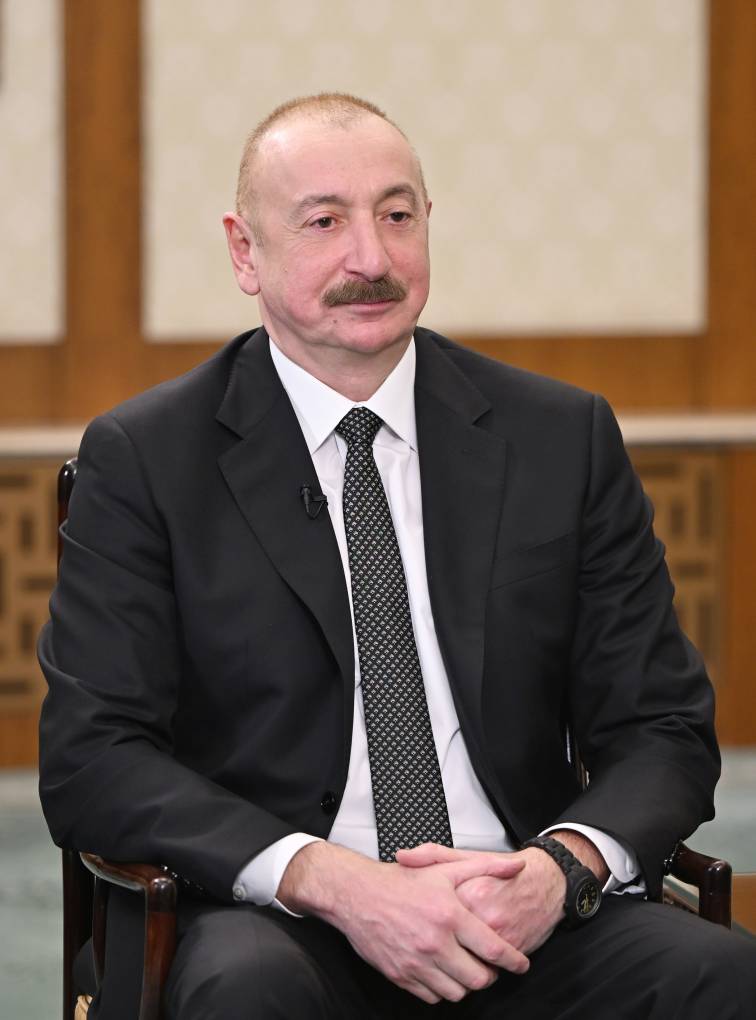
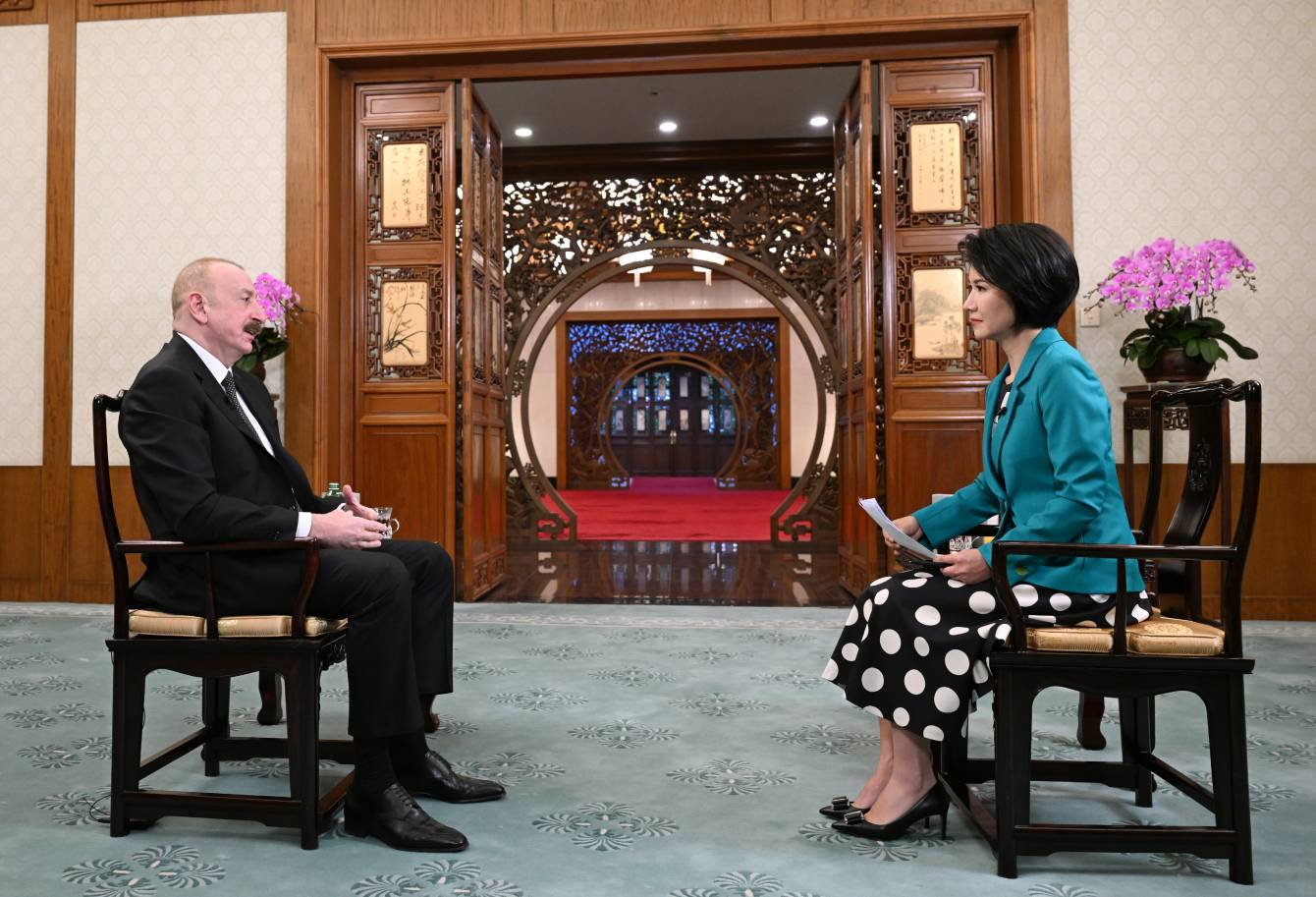
12:55
13:30
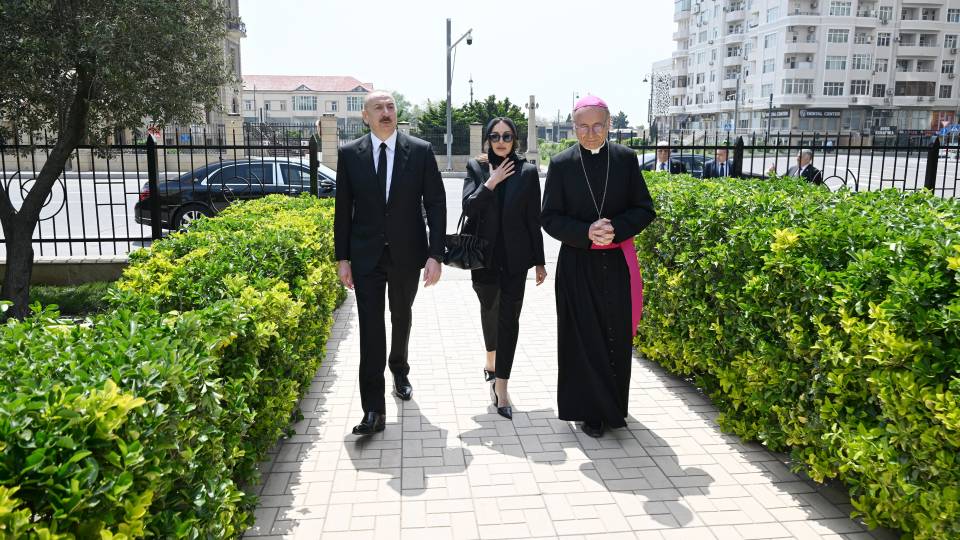
11:42
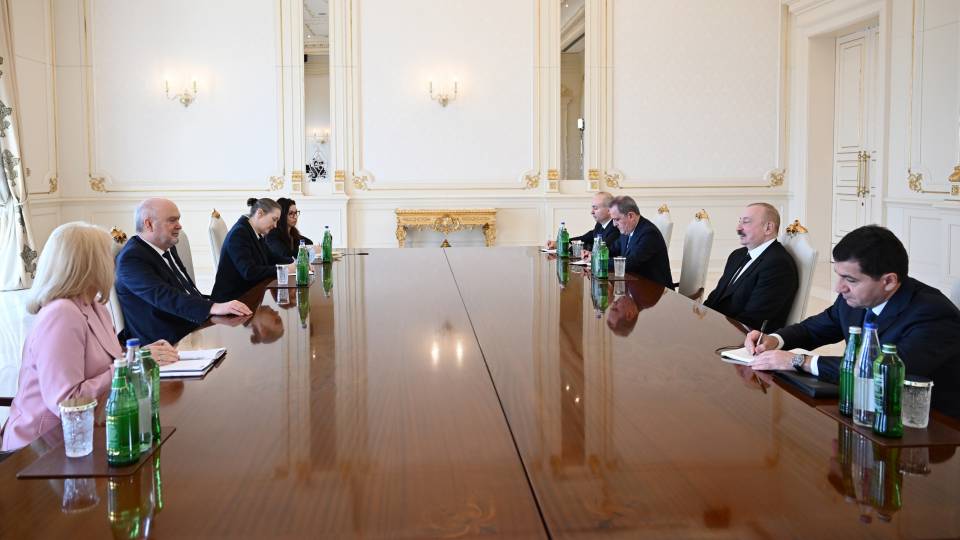
10:55
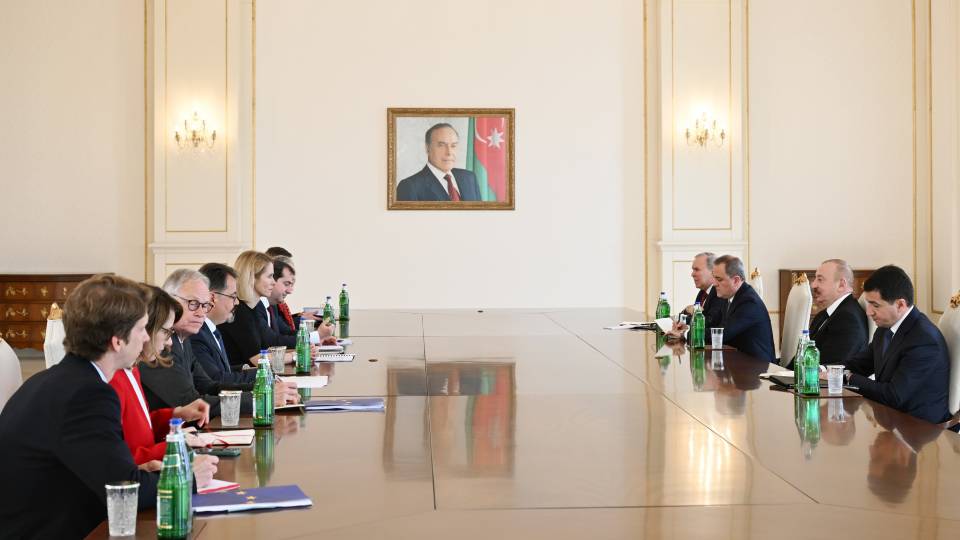
16:39
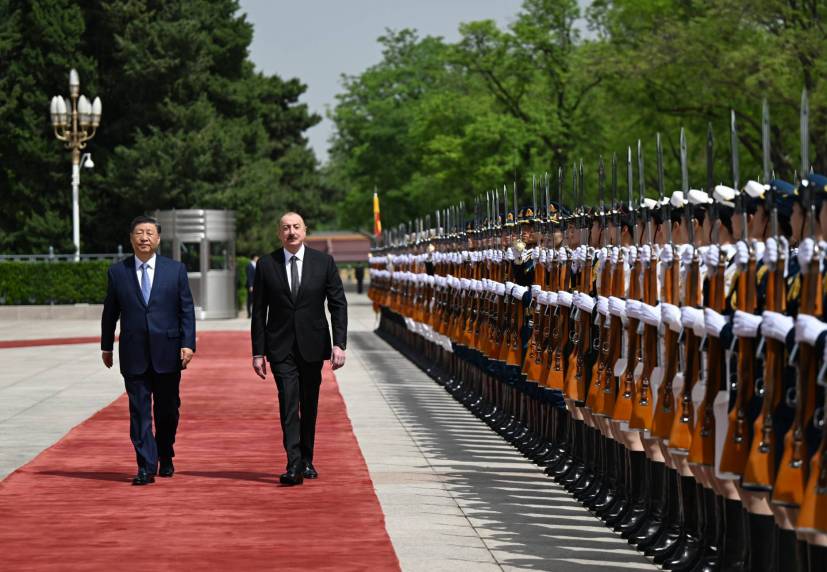
16:38
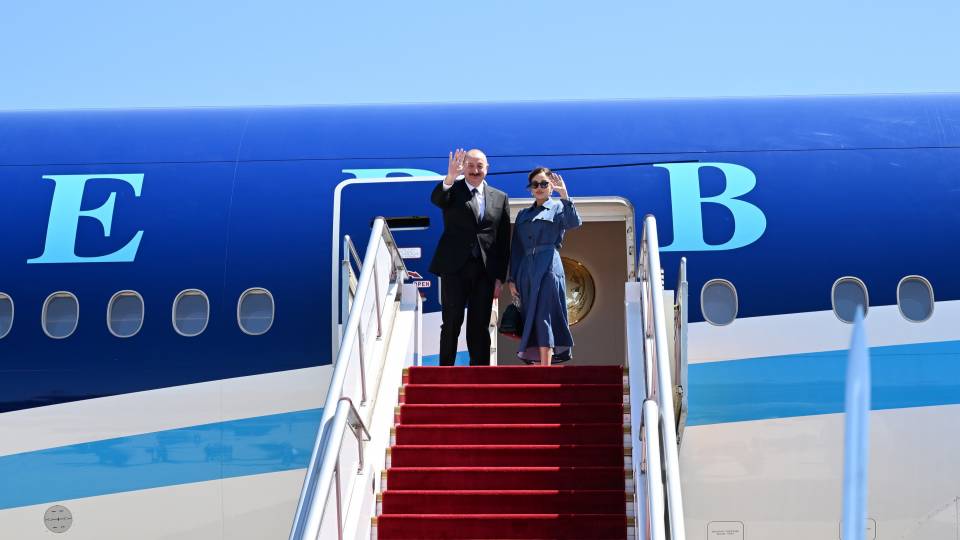
11:10
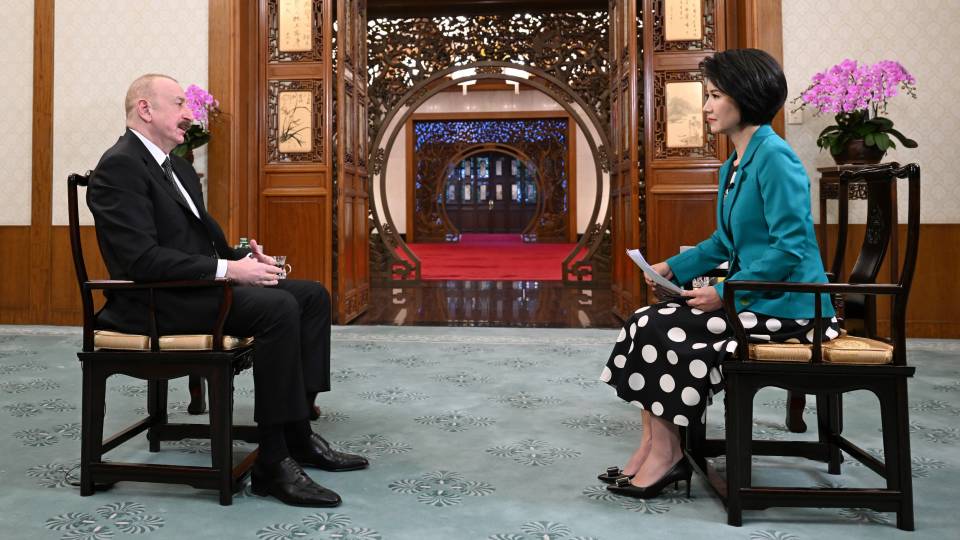
08:42
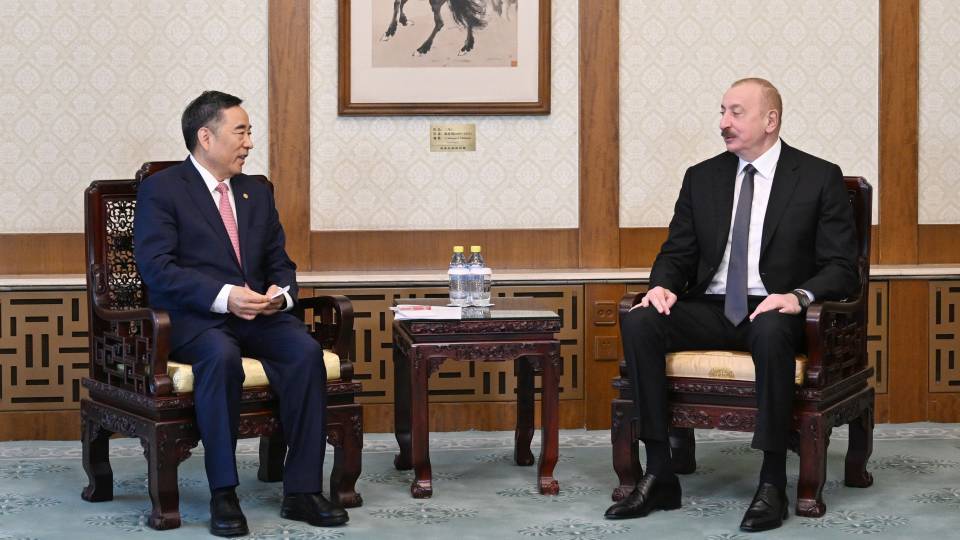
13:09
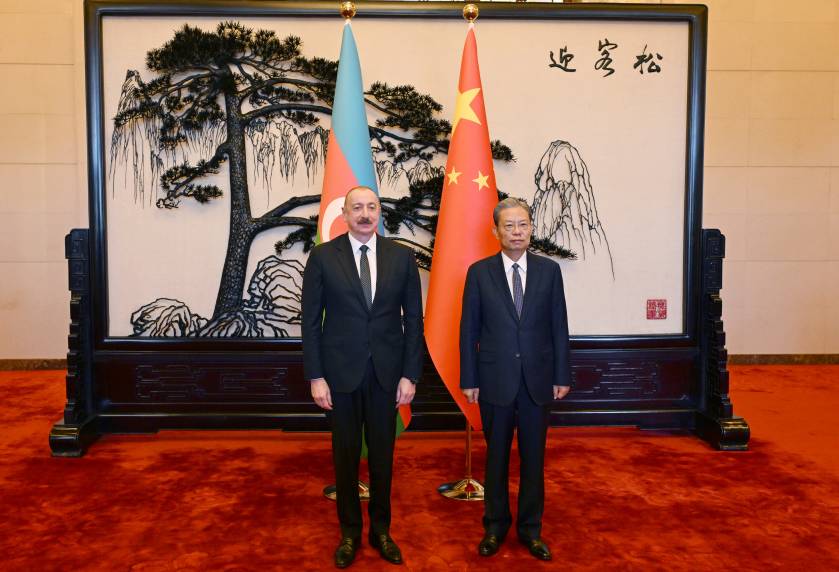
12:41
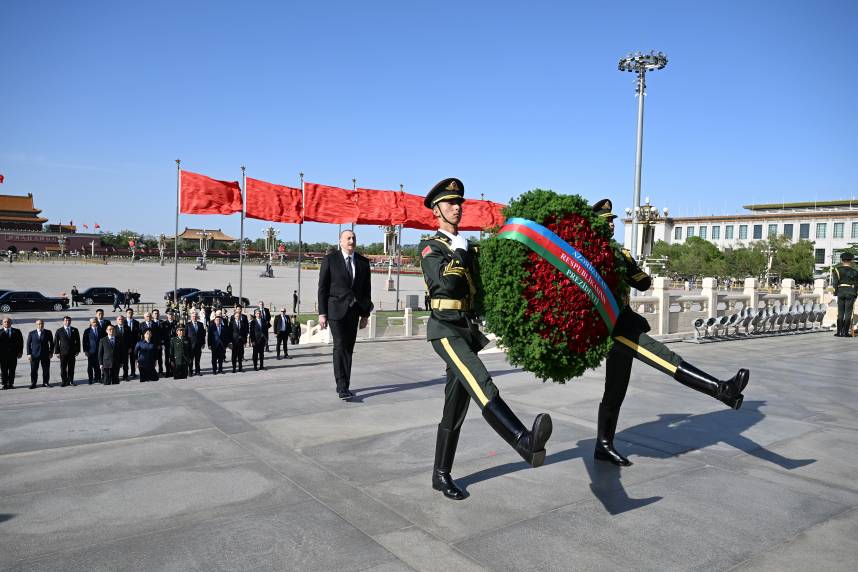
12:33
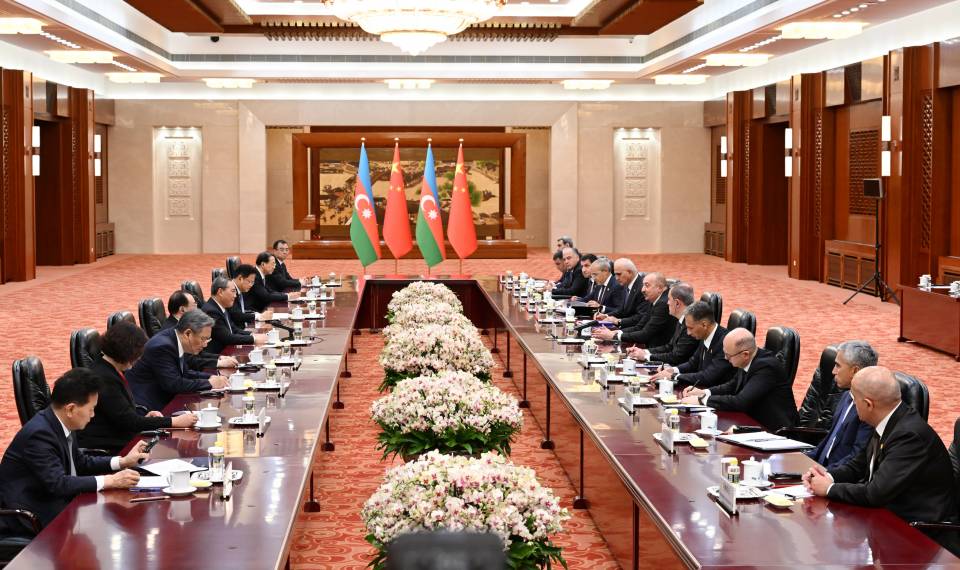
12:15
On April 23, President of the People's Republic of China Xi Jinping and First Lady Peng Liyuan hosted an official banquet in Beijing in honor of President of the Republic of Azerbaijan Ilham Aliyev and First Lady Mehriban Aliyeva.
23 April 2025, 12:15